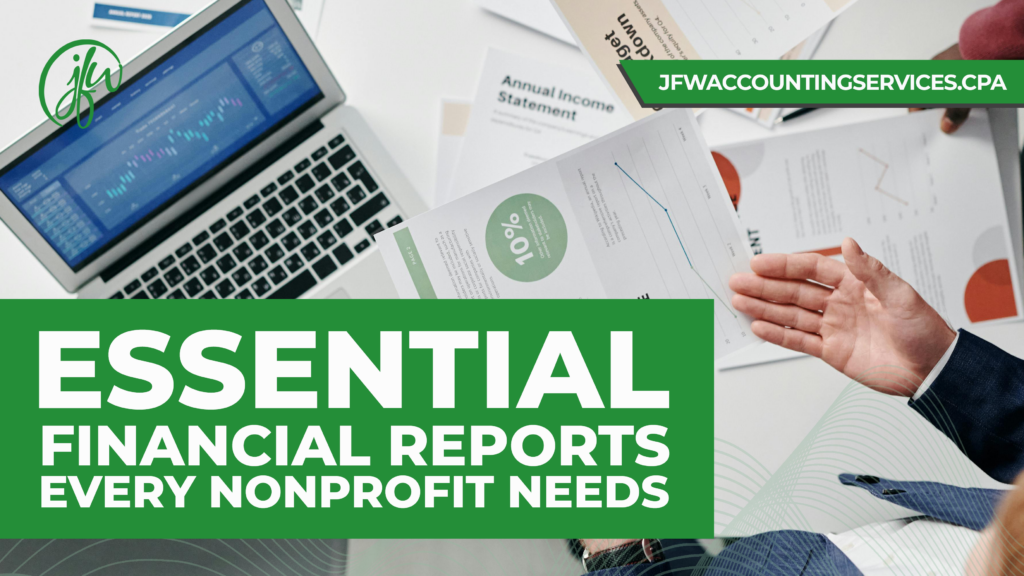Creating accurate financial reports for nonprofits is essential to the integrity and success of an organization. With these reports, nonprofits can guarantee they meet all compliance requirements, maintain transparency, and build trust with donors. These elements shape the long-term sustainability of a nonprofit organization.
For many nonprofits, the easiest way to stay compliant and handle complex accounting needs is to integrate a cloud-based software like Sage Intacct. This software not only tracks grant proposals and manages funds, but it also aids in the creation of financial reports for nonprofits.
Key Financial Reporting Standards for Nonprofits
Regarding nonprofit organizations the most recognized standard is the generally accepted accounting principles or GAAP. This financial report ensures that nonprofits are held to a high standard and are maintaining clear, accurate, and reliable financial reports that can be made accessible to all donors, stakeholders, the IRS, and other contributors.
Four Types of Financial Reports for Nonprofits
Nonprofit organizations rely on various financial reports to assess and communicate their financial health. These reports are essential for maintaining transparency with donors and stakeholders and play a critical role in regulatory compliance and strategic decision-making.
The four primary types of financial reports for nonprofit organizations serve as a foundational framework for understanding their financial standing and operational efficiency. Each report provides unique insights, guiding nonprofits in managing resources effectively and ensuring accountability.
Statement of Financial Position (Balance Sheet)
The first of four primary financial reports for nonprofits is the statement of Financial Position which is also commonly referred to as a Balance Sheet. This type of financial report offers insights into an organization’s assets and liabilities. The data collected is shared across all contributors, ensuring full transparency on the fiscal health of the organization. A statement of financial position is also important when proving that a nonprofit is compliant with all federal and state regulations.
Statement of Activities (Income Statement)
Similar to an income statement, a statement of activity breaks down an organization’s revenue and expenses within a specific timeframe. The report helps establish if the organization is at a profit or at a loss, which is crucial to understanding overall financial performance. These reports can then be used as leverage to access more grants/loans or find areas where costs could be cut.
Statement of Cash Flows
A statement of cash flows, which focuses on all inflows and outflows of cash, is another crucial type of financial report for nonprofits. A statement of cash flow offers a clear picture of liquidity and operational efficiency as it shows all cash that comes in and out of an organization. These records can help a nonprofit monitor its cash in real time and respond proactively to changes while also making smart financial decisions.
Statement of Functional Expenses
The 4th example on our list of essential types of financial reports for nonprofits is a statement of functional expenses. This specific financial report helps to break down expenses by function typically by program administrative and fundraising cost. These reports offer transparency which is crucial to donor trust and demonstrates responsible financial stewardship.
Additional Financial Reports and Insights
Beyond the four core types of financial reports for nonprofits, there is a fifth key report: the Annual Report. An annual nonprofit financial report is an externally facing resource designed to recap all the organization’s accomplishments and challenges in the last year.
It is important to note that while an annual report is not required by law, it can have tremendous impacts on the success of a nonprofit in the coming years. With an annual report, all contributors can see the tangible results of their donations and receive recognition, incentivizing them to donate more the following year.
Sage Intacct Simplifies Your Financial Reporting
Nonprofit organizations can build trust with their donors, become more aware of their fiscal situation, and achieve long-term success by integrating accounting software such as Sage Intacct. Like many nonprofit accounting software, Sage Intacct helps simplify the report creation process, track grants and billings, ensure financial compliance, and provide real-time insights. These features reduce administrative overhead, human-made errors, and overall team stress.
Request a client assessment today with JFW accounting services and learn more about how your organization can benefit from accounting software like Sage Intacct.

Jo-Anne Williams Barnes, is a Certified Public Accountant (CPA) and Chartered Global Management Accountant (CGMA) holding a Master’s of Science in Accounting (MSA) and a Master’s in Business Administration (MBA). Additionally, she holds a Bachelor of Science (BS) in Accounting from the University of Baltimore and is a seasoned accounting professional with several years of experience in the field of managing financial records for non-profits, small, medium, and large businesses. Jo-Anne is a certified Sage Intacct Accounting and Implementation Specialist, a certified QuickBooks ProAdvisor, an AICPA Not-for-Profit Certificate II holder, and Standard for Excellence Licensed Consultant. Additionally, Jo-Anne is a member of American Institute of Certified Public Accountant (AICPA), Maryland Association of Certified Public Accountants (MACPA), and Greater Washington Society of Certified Public Accountants (GWSCPA) where she continues to keep abreast on the latest industry trends and changes.

